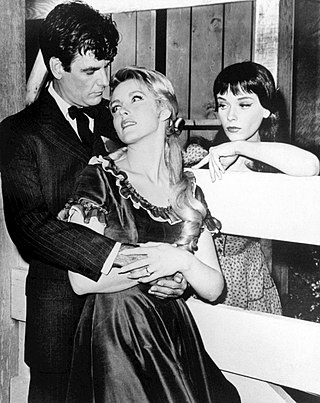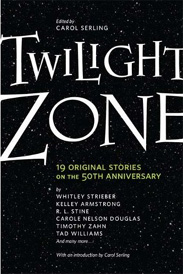
The Twilight Zone is an American media franchise based on the anthology television series created by Rod Serling in which characters find themselves dealing with often disturbing or unusual events, an experience described as entering "the Twilight Zone". The episodes are in various genres, including fantasy, science fiction, absurdism, dystopian fiction, suspense, horror, supernatural drama, black comedy, and psychological thriller, frequently concluding with a macabre or unexpected twist, and usually with a moral. A popular and critical success, it introduced many Americans to common science fiction and fantasy tropes. The first series, shot entirely in black-and-white, ran on CBS for five seasons from 1959 to 1964.

Rodman Edward Serling was an American screenwriter and television producer best known for his live television dramas of the 1950s and his anthology television series The Twilight Zone. Serling was active in politics, both on and off the screen, and helped form television industry standards. He was known as the "angry young man" of Hollywood, clashing with television executives and sponsors over a wide range of issues, including censorship, racism, and war.

"Where Is Everybody?" is the first episode of the American anthology television series The Twilight Zone and was originally broadcast on October 2, 1959, on CBS. It is one of the most realistic Twilight Zone episodes, as it features no supernatural elements and is based on fairly straightforward extrapolation of science.
"Walking Distance" is episode five of the American television series The Twilight Zone. It originally aired on October 30, 1959. The episode was listed as the ninth best episode in the history of The Twilight Zone by Time magazine.

"Time Enough at Last" is the eighth episode of the American anthology series The Twilight Zone, first airing on November 20, 1959. The episode was adapted from a short story by Lynn Venable, which appeared in the January 1953 edition of If: Worlds of Science Fiction.

"The Last Flight" is the eighteenth episode of the American television anthology series The Twilight Zone. Part of the production was filmed on location at Norton Air Force Base in San Bernardino, California. The vintage 1918 Nieuport 28 biplane was both owned and flown by Frank Gifford Tallman, and had previously appeared in many World War I motion pictures.
"The Purple Testament" is the nineteenth episode of the American television anthology series The Twilight Zone. It is "the story of a man who can forecast death". It originally aired on February 12, 1960, on CBS.
"Long Live Walter Jameson" is episode 24 of the American television anthology series The Twilight Zone.

"A Stop at Willoughby" is episode 30 of the American television anthology series The Twilight Zone. Rod Serling cited this as his favorite story from the first season of the series.
"A World of His Own" is episode thirty-six of the American television anthology series The Twilight Zone. It was the last episode of the show's first season and essentially comedic in tone. It originally aired on July 1, 1960, on CBS.
"It's a Good Life" is the eighth episode of the third season of the American television series The Twilight Zone, and the 73rd overall. It was written by series creator/showrunner Rod Serling, based on the 1953 short story "It's a Good Life" by Jerome Bixby. The episode was directed by James Sheldon, and is considered by some, such as Time and TV Guide, to be one of the best episodes of the series. It originally aired on November 3, 1961. The episode was one of four from the original 1959 series which formed the basis of the 1983 film Twilight Zone: The Movie.
"The Midnight Sun" is episode 75 of the American television anthology series The Twilight Zone, first shown in November, 1961.
"Still Valley" is episode 76 of the American television anthology series The Twilight Zone.

"In Praise of Pip" is an episode of the American television anthology series The Twilight Zone. In this episode, after learning that his soldier son has suffered a mortal wound in an early phase of the Vietnam War, a crooked bookie encounters a childhood version of his son.
An Occurrence at Owl Creek Bridge is a 1961 French short film, almost without dialogue. It was based on the 1890 American short story of the same name by American Civil War soldier, wit, and writer Ambrose Bierce. It was directed by Robert Enrico and produced by Marcel Ichac and Paul de Roubaix with music by Henri Lanoë. It won awards at the Cannes Film Festival and the Academy Awards. The film was later screened on American television as episode 22 of the fifth season of The Twilight Zone on 28 February 1964.

The Twilight Zone is an American fantasy science fiction horror anthology television series created and presented by Rod Serling, which ran for five seasons on CBS from October 2, 1959, to June 19, 1964. Each episode presents a standalone story in which characters find themselves dealing with often disturbing or unusual events, an experience described as entering "the Twilight Zone", often with a surprise ending and a moral. Although often considered predominantly science-fiction, the show's paranormal and Kafkaesque events leaned the show much closer to fantasy and horror. The phrase "twilight zone" has entered the vernacular, used to describe surreal experiences.
"A Quality of Mercy" is episode 80 of the American television anthology series The Twilight Zone, which originally aired on December 29, 1961. The title is taken from a notable speech in William Shakespeare's The Merchant of Venice, quoted in Serling's closing narration at the end of the episode.

"Jess-Belle" is an episode of the American television science fiction and fantasy anthology series The Twilight Zone. In this episode, a young woman, whose name sounds like "Jezebel", spurned by the man she loves, becomes a witch in order to make him love her.
Twilight Zone: Rod Serling's Lost Classics is a 1994 American made-for-television fantasy supernatural horror film consisting of two stories by Rod Serling. The film was co-produced by Serling's widow Carol Serling. Reportedly, she found the two pieces in a trunk in the family's garage.

Twilight Zone: 19 Original Stories on the 50th Anniversary is an anthology of short stories written by various authors and edited by Carol Serling, the widow of series creator Rod Serling. Each story was written with themes or styles similar to The Twilight Zone episodes, including a narrated introduction and conclusion. Authors who contributed stories include Twilight Zone veterans Earl Hamner Jr., Alan Brennert, William F. Wu, and Rod Serling. Reviewers listed some of the better stories as being Kelley Armstrong's "A Haunted House of Her Own", Alan Brennert's "Puowaina" and Mike Resnick and Lezli Robyn's "Benchwarmer".









